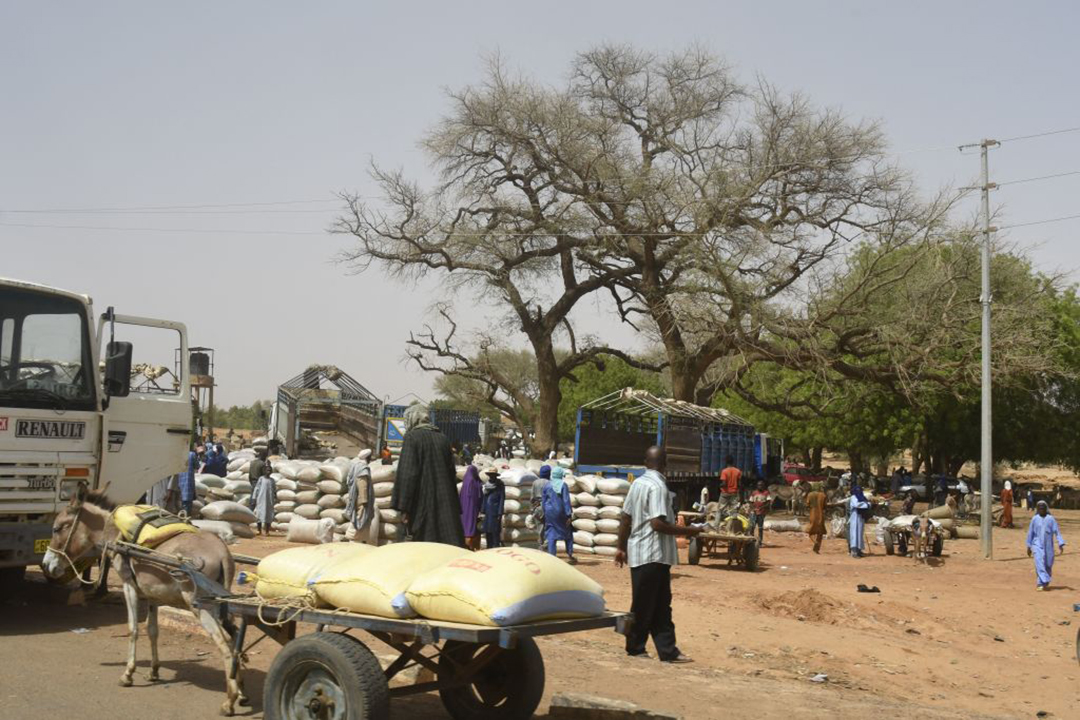Sahel-based Violence Ripples Across Borders into Coastal Countries
ADF STAFF
Checkpoints line the road between Tanguieta and Porga in northern Benin as Soldiers in armored vehicles patrol the region for terrorist activity.
This normally quiet corner of West Africa has seen four terrorist attacks since December by Mali-based Jama’at Nusrat al-Islam wal-Muslimin (JNIM), an extremist group linked to al-Qaida.
“We used to live a quiet life,” Mounou Y’Moussa, the imam of the central mosque in Porga, told the German news agency DW.com. “Today, it’s all about uncertainty and insecurity.”
Porga is a border town near the Point Triple where Benin, Togo, and Burkina Faso meet. Attacks there in December killed two Soldiers. In February, extremists ambushed Soldiers and forest rangers in the region with an improvised explosive device, a rocket and gunfire. The attack killed one Soldier, five rangers and a civilian with the African Parks Network.
Terrorists have also attacked in the northern reaches of West Africa’s coastal states as extremist violence in Sahel nations spreads south into their neighbors.
In May, JNIM attacked the town of Kpekankandi near Togo’s border with Burkina Faso, killing eight Soldiers and wounding a dozen others.
In 2021, Côte d’Ivoire reported multiple attacks along its border with Burkina Faso that killed several soldiers and injured others. Ghana has so far reported no attacks. However, the country is considered a transit zone for extremists.
“The coastal states share some of the same domestic vulnerabilities as their counterparts in the Sahel,” analyst Rida Lyammouri wrote recently at the Policy Center for the New South.
Those domestic vulnerabilities include a sense of neglect by the central government in remote areas where the poverty rate can top 60%. Porous borders allow extremists to move easily among countries, seeking refuge in one when they’re feeling pressure in another. Increasingly violent disputes between farmers and herders sharing land and resources also ratchet up tensions in the region.
“Threats posed by violent extremists expand as they exploit pre-existing transnational corridors, state failures and socioeconomic vulnerabilities present in communities,” Murtala Abdullahi, a researcher on conflict and security trends in Nigeria and Lake Chad Basin, told The Africa Report.
Additionally, extremists in the Sahel’s landlocked countries are trying to secure routes to the coasts for importing weapons and other illicit goods. As Boko Haram has done in northeast Nigeria, extremists are hiding in the national parks and wildlife preserves that straddle Benin’s borders with Burkina Faso and Niger.
Over the last year, government forces have captured extremists in the communities of Kouande and Kouatena, up to 140 kilometers inside Benin.
“At first, it was thought to be a phenomenon of transiting jihadists in the border areas,” Oswald Padonou, president of the Beninese Association of Strategic Studies and Security, told DW.com. “Today, we’re talking about micro-cells and recruitment in the north of Benin. The Islamic extremist phenomenon has gradually found space in the most marginalized areas.”
In 2017, Benin, Burkina Faso, Côte d’Ivoire, Ghana and Togo launched the Accra Initiative, a joint effort to strengthen security in the border region and prevent the spread of violence.
Nigeria-based public policy expert Samuel Sholaolu told The Africa Report that nations experiencing extremist incursions need to do more than respond militarily. Governments must pay more attention to the rural areas where extremists are operating, he said.
“Multifaceted and multinational interventions are required to curtail these violent extremist groups and curb their activities,” Sholaolu said. “It involves strengthening professionalism and the capacity of security forces while ensuring there is development in rural areas, and social justice for marginalized communities.”


Comments are closed.